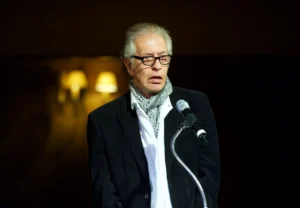A Life of Outstanding Music
At the age of 82, hitmaking record producer Richard Perry, who was renowned for fusing modern sounds with standards, passed away on Tuesday. According to his companion Daphna Kastner, he passed away at a hospital in Los Angeles after suffering a heart arrest.
Kastner described Perry as a “father friend” and godfather to her son, saying, “He made the most of his time here.” He was kind, entertaining, giving, and improved the world. Without him here, the world is a little less sweet, but in heaven, it is slightly sweeter.
A Diverse Profession
Perry started out as a doo-wop singer, oboist, and drummer before becoming well-known as a producer who was skilled in a variety of musical genres. His No. 1 successes on pop, R&B, dance, and country charts made him stand out. Among his credits are the songs “Without You” by Harry Nilsson, “I’m So Excited” by The Pointer Sisters, and “To All the Girls I’ve Loved Before,” a duet by Willie Nelson and Julio Iglesias.
Often referred to as a “musician’s producer,” Perry viewed musicians as colleagues rather than as means of achieving his goals. His clientele included Rod Stewart, who credited Perry with helping him revitalize his career, Barbra Streisand, and Fats Domino, whose career Perry helped revitalize.
With Icons All Around
Perry’s life and musical history frequently touched. He was backstage for Chuck Berry and Little Richard in the 1950s, saw Otis Redding’s iconic performance at the 1967 Monterey Pop Festival, and was there when the Rolling Stones recorded “Let It Bleed.”
In addition, he was briefly married to actress Rebecca Broussard and had intimate contacts with superstars such as Elizabeth Taylor and Jane Fonda. In his memoir, Stewart described Perry’s residence in West Hollywood as a center for “late-night skulduggery.”
The Beatles Association
Perry produced Ringo Starr’s commercially successful 1973 album Ringo in the 1970s. All four of the Beatles and well-known musicians like Harry Nilsson contributed to the album. John Lennon’s song “I’m the Greatest,” which brought Lennon, Starr, and George Harrison back together after the Beatles, was one of the album’s highlights. Perry referred to the encounter as the fulfillment of a lifelong ambition.
Although he didn’t sing on “I’m the Greatest,” Paul McCartney did contribute to the album’s ballad “Six O’Clock,” which was sung by McCartney and his wife Linda.
“You’re So Vain” Is Perfect
Carly Simon’s stinging lament “You’re So Vain,” which peaked at number one and became a cultural sensation in 1972, was produced by Perry. The topic of the song has been up for debate for decades, but in his memoir, Perry disclosed that it was “a composite of several men” that Simon dated, mainly Warren Beatty.
Successes and Legacy Later
With songs like “Neutron Dance” by The Pointer Sisters and “Rhythm of the Night” by DeBarge, Perry carried on producing into the 2000s. Notably, he helped Rod Stewart get through a creative rut by contributing to his The Great American Songbook recordings. While Stewart softly sang possible songs, Perry and Stewart worked on the idea throughout dinner, writing down ideas on a napkin.
Childhood and Musical Origins
Perry, who was born into a musically interested family in New York City, picked up drums and oboe at a young age and joined the Escorts, a doo-wop group. Perry, a University of Michigan theater and music major, first envisioned himself on Broadway before switching to music production in the 1960s.
Perry had already created cult favorites by the end of the decade, such as Tiny Tim’s debut album and Captain Beefheart’s Safe As Milk. On Ella, he collaborated with Ella Fitzgerald, who sang interpretations of songs by Randy Newman, Smokey Robinson, and the Beatles.
Streisand’s Stoney End, which Perry produced in the early 1970s, helped her make the switch from show tunes to pop and rock. Perry’s enthusiasm and inventiveness were commended by Streisand, who described their partnership as “fun and musically liberating.”
As a producer who valued performers, encouraged innovation, and produced music that appealed to many generations, Richard Perry leaves a lasting legacy.

The latest news and breaking news today : bravenewclimate
Source : apnews






.png)





